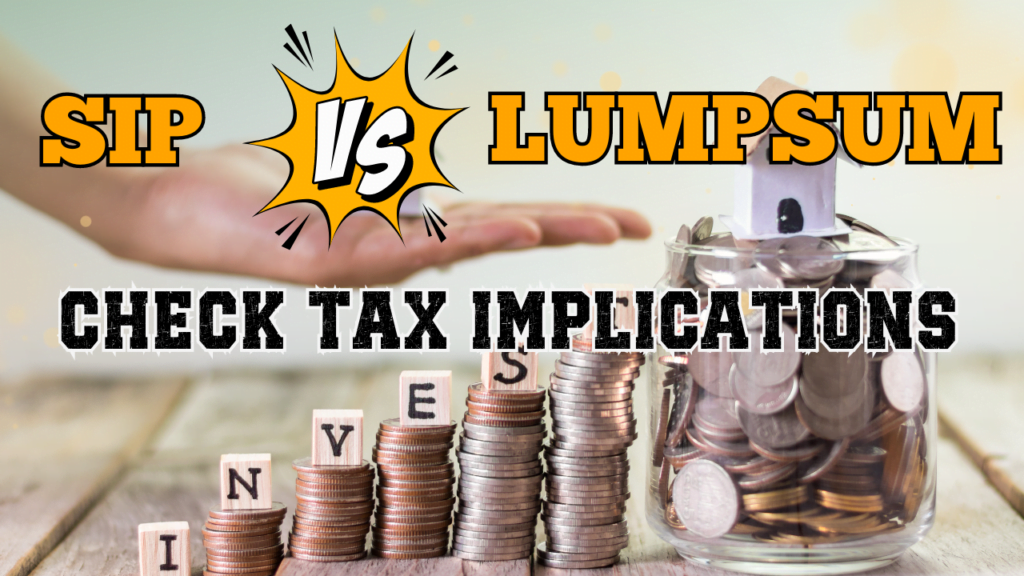When you and I decide to invest in mutual funds to gain extra returns compared to other available schemes, we miss one point on how the taxation works in SIP or Lump-Sum investment, what are pros and cons and why to choose SIP or Lumpsum investment strategy. I will answer these questions in this post.
This post can help you in designing your own strategy by evaluating comparing pros and cons instead of following someone’s or my strategy. You will be able to ask questions from your expert advisers when deciding future goals.
SIP (Systematic Investment Plan):
In my previous post also, I discussed what SIP is? However, on a short note – An SIP allows you to invest a fixed amount of money in a pre-decided savings scheme, usually it is a mutual fund in most of the cases. at regular intervals (monthly, quarterly, etc.). It’s like building a saving habit through a recurring payment for the investments, fostering financial discipline and building consistency.
Pros of SIP:
First, I will discuss the benefits of SIP and why you should do: –
1. Build savings habit: There is no end of expenses and with endless expenses, no one can build its future and achieve financial goals. It’s always advisable to save from your monthly income every month and invest in different investment plans to achieve future goals. You can follow my financial planner tool (free of cost) to know where to invest monthly savings and in what ratio. If you don’t have a habit of saving, do develop it at least for the future.
2. Rupee-Cost Averaging: through SIPs in mutual funds, you invest in the equity market. By investing small amounts periodically, you purchase units at various price points, potentially averaging out the cost per unit over time. This is called Rupee-Cost Averaging. SIP investment on regular intervals helps mitigate market volatility and also lower risk factors on your investments.
3. Flexibility: through SIPs, you have flexibility in terms of investment amount and frequency. You can start with smaller contributions and gradually increase them as your income grows.
4. Suitable for All retail investors: SIPs are ideal for both seasoned and novice investors. They allow beginners like you, to build a strong investment corpus gradually and a good portfolio, aiming for long-term wealth creation and future goals.
Cons of SIP:
When you invest regularly in mutual funds, you buy the mutual funds at a high price during market rise and this results in averaging your profit also and lower returns. This is not every time, and because of this advantage you should stop doing SIPs.
Lumpsum Investment:
A lump sum investment involves investing a larger sum of money in a chosen mutual fund scheme at a single point in time. Suppose, you have a big amount 1-2 lakh which you can invest without disturbing your expenses. You invest this whole sum amount in a mutual fund without worrying of paying a fixed amount on regular intervals. This approach can be particularly appealing when you have a significant amount of idle cash available. If you are new or have just started as an investor, it is not advisable to start with a lump-sum investment, as it needs financial literacy to invest in the right investment schemes.
Pros of Lumpsum Investment:
1. Potential for Higher Returns: If you invest during a market dip, a lump sum investment can potentially generate higher returns compared to SIPs invested at varying price points.
2. Simpler Investment Management: Lumpsum investments require less ongoing management compared to SIPs. Once invested, you don’t need to worry about recurring contributions.
3. Suitable for Market Timing (potentially): Investors with a strong understanding of market trends might use lumpsum investments to capitalize on perceived market lows. However, accurately timing the market consistently is challenging.
4. Better alternative of Fixed Deposit: For experienced investors, it is a better option than Fixed Deposit, as it can fetch better returns. Only condition, you have to invest timely and with research of the mutual funds and equity market.
But, my personal opinion is that, keep some amount in FD and some amount in mutual funds as lump sum, if you have lumpsum amount to invest. Ratio of investment depends on the individual and his risk taking capacity.
Cons of Lump-sum:
You have to keep watch on the market and wait for the right time to invest in. At the right time, you may get up buying mutual funds with all your savings. This brings more volatility in your portfolio. If you can manage market volatility, have an idle fund to invest (other than emergency funds) and have a high risk appetite, you go for lumpsum investment.
Tax Implications of SIP and Lump-sum:
Capital Gains Tax: Both SIP and lumpsum investments are subject to capital gains tax when you redeem your units. The applicable tax rate depends on the holding period (short-term or long-term) and the type of mutual fund (equity or debt).

Dividend Distribution Tax (DDT): For dividend distribution from equity mutual funds, SIP investors benefit slightly. Dividends reinvested in SIPs are not subject to DDT, whereas lumpsum investors pay DDT on the entire dividend received. However, this benefit might be less significant in the long run compared to the potential for higher returns from lump sum investing (if timed correctly).
Holding Period: The tax rate applicable to your capital gains depends on the holding period of your mutual fund units:
Short-term Capital Gains (STCG)
Short-term Capital Gains (STCG): If you redeem your units within one year of purchase, the STCG is taxed at a flat rate of 15%. But I would like to tell you the negative side of SIP in terms of taxation. SIP investments involve multiple purchases at different price points throughout the investment period. When you redeem your SIP units, each unit’s holding period is calculated individually based on its purchase date.
Therefore, you may be taxed at 10% and 15% both depending upon how and when you invested and withdrew the amount.
Long-term Capital Gains (LTCG)
Long-term Capital Gains (LTCG): It is simple to remember when you redeem mutual fund units after one year attracts LTCG tax. Here’s how it’s calculated:
Up to ₹1 lakh of LTCG from equity funds in a financial year is exempt from tax.
LTCG exceeding ₹1 lakh from equity funds is taxed at 10% without indexation (a mechanism that adjusts for inflation). In simple words, it means that if you have a gain of 3 lakhs, you will pay tax only on 2 lakh i.e.,20,000 rupees.
This is a significant change compared to the previous tax regime where LTCG on equity exceeding ₹1 lakh attracted a 10% tax with indexation, effectively reducing the tax burden.
This means some units might qualify for LTCG exemption (up to ₹1 lakh) while others might be taxed as STCG (at 15%).
Considering the ₹1 lakh LTCG exemption on equity funds, It is good for those who can manage their lump-sum amount by investing in equity mutual funds. SIPs offer a slight tax benefit in the long run. Since SIPs involve multiple purchases, you have the potential to spread your gains across multiple financial years, potentially maximizing the use of the ₹1 lakh exemption limit in each year. However, you need to adjust your investment according to the market to invest lump-sum. It can be an individual choice not bound to everyone. Choose the plan based on your savings habit.
Choosing Between SIP and Lump Sum:
Choose SIP if:
- A limited investment amount to start with.
- Try to seek benefit from rupee-cost averaging.
- You prioritize building financial discipline with regular investments.
Choose Lump Sum if:
- Better option to invest a significant amount of idle cash available.
- Take advantage of the market when it is undervalued (be cautious of market timing).
- It is a simpler investment management approach, and can rotate funds when needed.
Conclusion:
Both SIP and lump sum investing offer distinct advantages, and are taxed differently. By understanding their unique characteristics, tax implications, and suitability for different scenarios, you can make an informed decision that can match with your financial goals and risk tolerance.
Financial planning is like a finger-print. It always varies from individual to individual and has to be planned according to individuals goals and expenses. Remember, seeking guidance from a qualified financial advisor can help you create a personalized investment strategy that leverages the strengths of both SIP and lump sum approaches.










2 Comments
View Comments